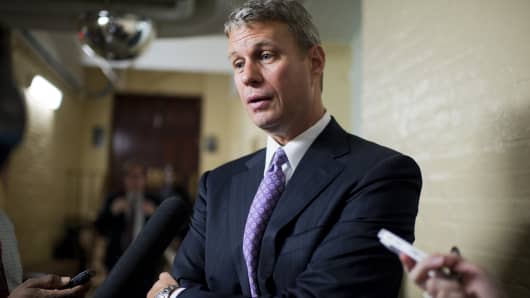Democrats have consistently resisted reforms that would modernize the Federal Reserve, bringing much needed transparency to what most Americans consider an impossibly opaque institution. While such reforms promise increased accountability, Democrats falsely claim that a better disciplined, more predictable, and clearly communicated monetary policy would jeopardize the Fed's independence.
Only a flat Earth society could support the lack of discipline, predictability, and transparency in a bureaucracy. Democrats, instead, are opposing promising reforms to create a smokescreen for something much more nefarious - a partisan takeover of the Federal Reserve.
How, one might ask, can the Fed be taken over? The answer comes from Congressional Democrats, who are simply following the corporate raider's playbook.
After establishing an ownership toehold, raiders pressure boards to favor their own interests over others. Through a Trojan-horse provision, the Dodd-Frank Act of 2010 lit the fuse toward this end, tilting the process by which Federal Reserve District presidents are appointed in favor of candidates who instinctively lean toward accommodative monetary policies.
Before Dodd-Frank, all directors for each Federal Reserve District participated in the nomination of candidates to succeed their outgoing president. Dodd-Frank, unbeknownst to many, recklessly amended Section 4 of the Federal Reserve Act to silence Class A directors during this process.
Class A directors are commercial bankers who are elected by bankers to represent the interests of bankers. Those interests hardly include shrinking economic opportunity. Indeed, as people whose business frequently relies on making fixed-rate loans, these directors maintain the strongest of interests in a sound monetary policy that simply eases the way for goods and services (including labor) to find their most promising opportunities.
This alignment of incentives and insulation from Washington's politics help rationalize why district bank presidents have tended to serve as dutiful stewards of sound monetary policy – a strategy that the first person to chair President Obama's Council of Economic Advisers characterized as "compassionate," since it is "the most likely to permanently improve conditions for the poor."
When Dodd-Frank disenfranchised Class A directors, the consequences were extremely predictable. For example, it is unsurprising in this light that recent District appointments in Dallas, Philadelphia, and Minneapolis saw doves replace more hawkish presidents.
Striking this obscure section from Dodd-Frank could put monetary policy and our economy on a better track. But rather than embrace the promise of increased opportunity that such a repeal offers, Democrats are doubling down to completely silence interests in price stability and institutionalize a far more centrally controlled monetary policy.
Recently, the Democratic Party Platform spelled out a plan for eliminating Class A directors altogether from District boards, and disenfranchising any of the Districts' shareholding banks from the election of directors. Democrats falsely claim this will preserve the Federal Reserve's independence, but governance experts see it for what it is – a naked grab for central control.
Should this coup succeed, District Bank directors would be selected not for their interest in increasing economic opportunity wherever it shows promise, but rather in channeling resources to where they maximize political favor.
Worse than a pretense of knowledge, the Democrat's platform demands a duplicitous straightjacket, consigning people to partisan dependence instead of reliably supporting their opportunity to flourish.
Americans typically rebound in short order from recessions, even those associated with financial crises. Unfortunately, this time is different. Already, Dodd-Frank has negatively impacted and restricted what Americans can and cannot do. If those who favor giving even more power to the central planners to achieve their goal, history will show that Dodd-Frank served as the lynchpin for creating an even less informed and more distortionary monetary policy.
Sound monetary policy facilitates commerce wherever it shows promise. But when monetary policy is manipulated to favor certain interests, it leaves savers and investors guessing about where they can create real value. If Democrats were truly interested in maintaining an independent Federal Reserve, they would abandon their veiled attempt to take over the Fed. Failing to do so will fundamentally compromise not only our nation's monetary policy, but also the ability to break out of the weakest economic recovery of our lifetimes.


